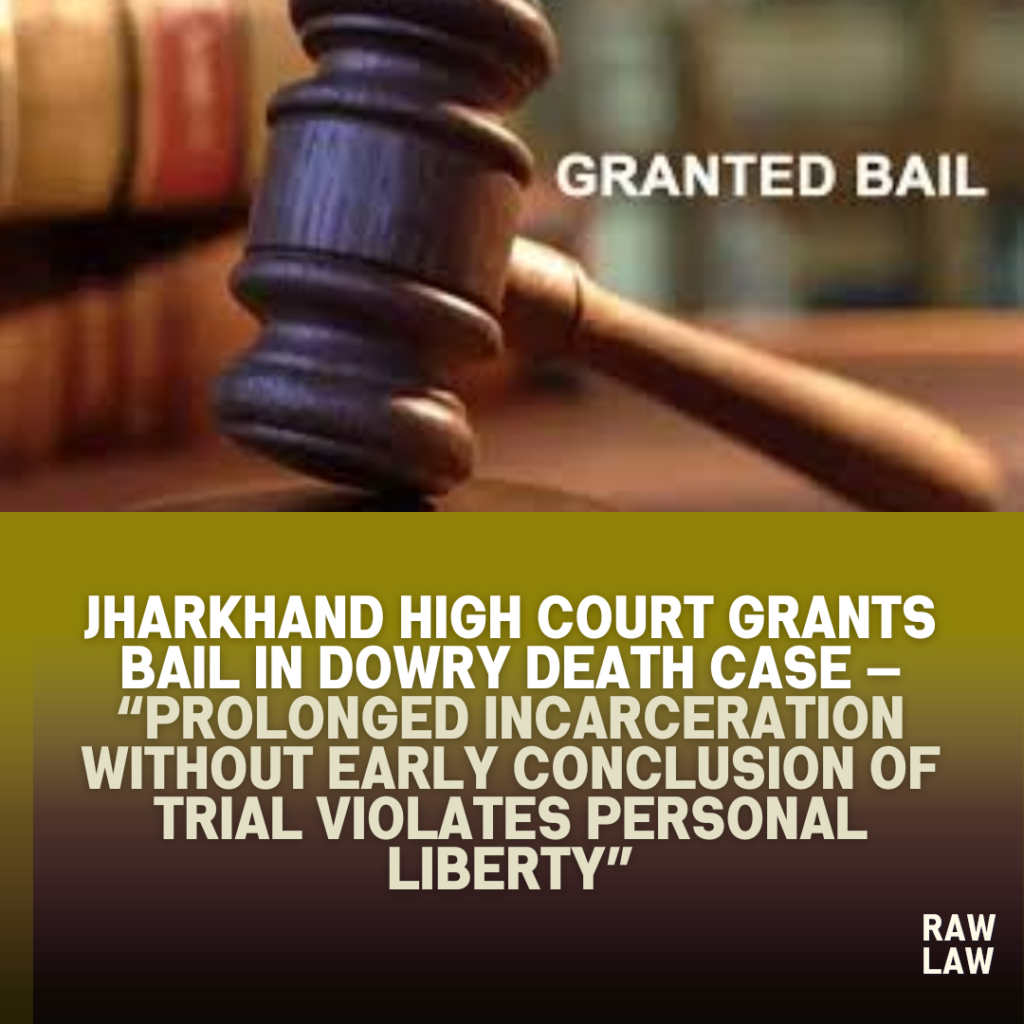Court’s Decision
The Jharkhand High Court allowed the petitioner’s bail application in a case alleging dowry death under Sections 304-B, 201, 498-A of the Indian Penal Code and Sections 3/4 of the Dowry Prohibition Act. The Court observed that the petitioner had been in custody for over three years, the trial had not concluded, and there was no likelihood of early completion. Emphasizing that prolonged incarceration amounts to a violation of the right to personal liberty under Article 21 of the Constitution, the Court granted bail subject to conditions.
Facts
The prosecution alleged that the petitioner, along with other family members, subjected the deceased—his wife—to cruelty in connection with dowry demands. The victim was reportedly found dead under suspicious circumstances within seven years of marriage, triggering the presumption under Section 113-B of the Indian Evidence Act. An FIR was registered for dowry death, causing disappearance of evidence, cruelty to a woman, and offences under the Dowry Prohibition Act.
The petitioner was arrested in 2021 and remained in judicial custody. The trial proceeded slowly, with prosecution witnesses yet to be fully examined. The petitioner argued that the case suffered from evidentiary weaknesses and delay in trial, justifying bail.
Issues
- Whether prolonged incarceration without conclusion of trial amounts to a ground for bail in dowry death cases.
- Whether the petitioner’s continued detention was justified in light of the presumption under Section 113-B of the Evidence Act and the gravity of charges.
- The balancing of the right to personal liberty under Article 21 against the societal interest in prosecuting serious offences like dowry death.
Petitioner’s Arguments
The petitioner contended that he had been falsely implicated due to matrimonial disputes. He argued that the investigation had been completed and the chargesheet filed long ago, leaving no scope for tampering with evidence or influencing witnesses. It was highlighted that he had been in custody for over three years and that the trial was unlikely to conclude soon, thereby violating his fundamental right to speedy trial. The petitioner also asserted that the co-accused had already been granted bail on similar grounds, and thus he was entitled to parity.
Respondent’s Arguments
The State opposed the bail plea, submitting that the charges were of a grave nature involving the unnatural death of a young woman within the matrimonial home, allegedly due to dowry harassment. It was argued that granting bail in such serious offences would send a wrong message to society and could potentially affect witness testimony. The prosecution stressed that the statutory presumption under Section 113-B of the Evidence Act weighed against the petitioner and justified continued detention.
Analysis of the Law
The Court examined the interplay of Sections 304-B and 498-A IPC with Section 113-B of the Evidence Act, which creates a presumption of dowry death when a woman dies under abnormal circumstances within seven years of marriage coupled with evidence of cruelty or harassment for dowry soon before her death. While acknowledging the seriousness of such offences, the Court reiterated that bail considerations must also account for the constitutional guarantee of speedy trial under Article 21.
The Court relied on the principle that denial of bail cannot be used as a punitive measure when the delay in trial is attributable to systemic factors rather than the accused.
Precedent Analysis
The Court drew guidance from:
- Hussainara Khatoon v. Home Secretary, State of Bihar — Reaffirmed the right to speedy trial as part of Article 21.
- Babu Singh v. State of U.P. — Held that deprivation of liberty must be reasonable, just, and fair.
- Union of India v. K.A. Najeeb — Clarified that prolonged incarceration, even in serious offences, can justify bail when there is no likelihood of early trial completion.
These precedents collectively underscored that prolonged detention without trial conclusion cannot override constitutional liberties.
Court’s Reasoning
The Court noted that the petitioner had been incarcerated since 2021 and that the trial was far from completion, with multiple witnesses yet to be examined. It emphasized that the presumption under Section 113-B does not displace the constitutional safeguards available to an accused. The Court reasoned that liberty should not be curtailed indefinitely, especially when the prosecution had not demonstrated any risk of the petitioner fleeing justice or tampering with evidence.
The Court found that the co-accused’s release on bail further strengthened the case for parity.
Conclusion
Granting bail, the Court directed the petitioner to furnish adequate sureties and to comply with conditions such as attending court regularly and not attempting to influence witnesses. The order reiterated that prolonged pre-trial detention without a realistic prospect of conclusion violates the essence of Article 21.
Implications
This ruling reinforces the judiciary’s stance that the right to personal liberty and speedy trial applies even in grave offences like dowry death. It signals that courts will intervene to prevent indefinite detention when the prosecution cannot ensure timely trial completion. It also underscores the importance of parity in bail decisions where similarly placed co-accused have already been granted relief.
Referred Cases and Their Application Here
- Hussainara Khatoon — Used to underline the fundamental right to speedy trial.
- Babu Singh — Applied to stress that bail is the norm and jail is the exception when detention becomes unreasonable.
- K.A. Najeeb — Relied upon to justify bail due to long custody and delayed trial in serious offences.
FAQs
1. Can prolonged detention be a ground for bail in dowry death cases?
Yes. Courts have held that excessive pre-trial incarceration without early completion of trial violates the right to personal liberty under Article 21.
2. Does the presumption under Section 113-B of the Evidence Act bar bail?
No. While it strengthens the prosecution case, it does not override constitutional safeguards like the right to speedy trial.
3. Does parity with co-accused matter in bail decisions?
Yes. If co-accused with similar roles have been granted bail, courts generally extend the same benefit unless there are distinguishing factors.
